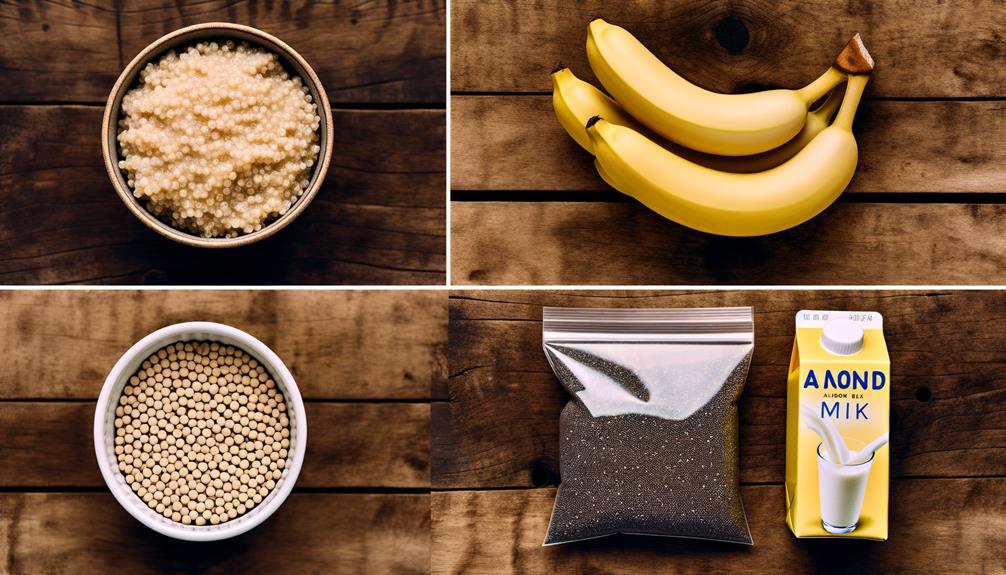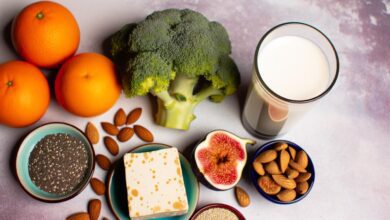Switching to a plant-based lifestyle is like learning a new language – it can be challenging but rewarding once you get the hang of it. As you embark on this health-conscious journey, you'll need to know the basics of plant-based essentials. From understanding key vegan products to ensuring proper nutrient intake, every step matters. But don't worry, you're not alone in this voyage. Here are four insightful tips to help you transition smoothly to a greener plate. You'll be surprised how your health and taste buds can be transformed by going plant-based, but you'll have to stick around to find out how.
Key Takeaways
- Familiarize yourself with whole food plant-based items and their nutritional value
- Make simple swaps in your favorite meals to incorporate more plant-based options
- Gradually incorporate more plant-based recipes into your routine and experiment with new flavors and textures
- Seek support from online communities or local vegan groups and educate yourself about the environmental and ethical benefits of a plant-based lifestyle
Understanding Essential Vegan Products
Diving into the world of essential vegan products, it's vital to understand the nutritional value and benefits each item brings to your plant-based journey. As you navigate the grocery store aisles, familiarize yourself with whole food plant-based items that will become the mainstay of your vegan diet. These products, teeming with nutrients, can provide the foundation for your health-conscious endeavor.
However, understanding essential vegan products isn't just about knowing what to buy. It's about building a solid knowledge base about plant-based nutrition. This can be achieved by reading up on the subject, attending workshops, or consulting a Registered Dietitian. Armed with the right knowledge, you'll be able to make informed choices that align with your dietary goals.
The shift to a plant-based diet may come with its mindset challenges. It's important to approach this transition with a positive attitude. Remember, every step you take towards adopting this diet is a step towards better health and a more sustainable lifestyle. By implementing practical action steps and strategies, you can overcome any hurdles along the way. Embrace the journey, and enjoy the wholesome goodness of a vegan lifestyle.
Transitioning to Plant-Based Foods
As you bolster your understanding of essential vegan products, it's time to take the next step and start incorporating more plant-based foods into your everyday meals. Transitioning to plant-based foods can seem daunting, but with a few easy tweaks, you'll find it quite manageable.
Start by making simple swaps in your favorite meals. For example, try topping your salads with beans instead of meat or experimenting with tofu in your stir-fry. These small changes can make a big difference in your journey to eating plant-based.
Don't feel pressured to make the switch overnight. Gradually incorporating more plant-based recipes into your routine helps your body adjust and keeps the change sustainable. Remember, the goal is to nurture your body, not stress it.
Embrace the adventure of discovering new flavors and textures. Beginners often find this exploration exciting as they dive into the world of plant-based essentials. And don't forget, patience is key in this transition. Listen to your body's needs, adjust your diet accordingly, and keep experimenting. Before long, you'll have a repertoire of plant-based recipes that you love and a lifestyle that serves your health, the environment, and the animals.
Nutrition Tips for Vegan Beginners
Embarking on your vegan journey, it's crucial to equip yourself with nutrition tips for vegan beginners that will not only ensure your health but also make your transition enjoyable and sustainable. Plant-based essentials are your go-to for a robust vegan diet.
Firstly, ensure you consume a variety of plant foods to get a wide range of nutrients. Whole grains, nuts and seeds, legumes, and an array of colorful fruits and vegetables are a must. They'll provide you with iron, calcium, zinc, and iodine, nutrients often overlooked in a vegan diet.
Secondly, don't rush your transition. Gradual changes are more sustainable, and this approach allows you to celebrate small wins, boosting your confidence.
Simplifying meal preparation is also a great tip for beginners. Learning to cook a few simple dishes, substituting plant-based alternatives for non-vegan foods in your favorite recipes, can make the change easier and more enjoyable.
Lastly, cultivating a positive mindset is critical. Embrace the journey, be patient with yourself and remember why you chose this path. This is more than a diet; it's a lifestyle of compassion, health consciousness, and commitment to serve others.
Sourcing and Preparing Vegan Meals
Navigating the world of vegan meals, you'll find a treasure trove of plant-based foods and flavors to explore, and learning where to source and how to prepare them can make your dietary transition more enjoyable and nutritious. Start by gradually incorporating more plant-based foods into your meal plans. Opt for simple swaps like topping salads with beans instead of meat.
Experiment with new plant-based foods and flavors. Don't be afraid to try foods you may not have considered before, tofu for instance. It's important to be patient with the transition process. A plant-based diet is high in fiber, so give your gut time to adjust.
Ensure you're meeting nutrient intake on a plant-based diet by focusing on whole food sources. Here's a handy Grocery List to help you out:
| Food Group | Nutrient-Rich Options | Meal Ideas |
|---|---|---|
| Protein | Tofu, Beans, Lentils | Tofu Stir-fry, Bean Salads |
| Calcium | Kale, Almonds, Broccoli | Almond Smoothies, Steamed Broccoli |
| Iron | Spinach, Quinoa, Lentils | Spinach Salad, Quinoa Bowl |
| B12 | Nutritional Yeast, Plant-based Milks | Sprinkle on Popcorn, In Smoothies |
| Zinc | Whole Grains, Nuts, Legumes | Whole Grain Pasta, Nut Snacks |
Frequently Asked Questions
What Are the Basics of a Plant-Based Diet?
You're exploring a plant-based diet, huh? Prioritize whole foods like fruits, vegetables, legumes, and seeds. Consider health benefits and meal planning. Remember, it's your transition, so find your balance with plant proteins and nutrient sources.
How Do You Become a Plant-Based Beginner?
You start by embracing plant-based motivation and understanding the dietary challenges. Then, perfect your nutrition planning, grocery shopping, and meal prep strategies. Transitioning to veganism is a journey, but you've got this. Good luck!
What 5 Foods Do You Eat That Are Plant-Based?
You're eating quinoa for its benefits, using avocado in many dishes, preparing tofu creatively, understanding and incorporating legumes, adding berries for sweetness, and realizing the importance of leafy greens in your plant-based diet.
Can You Eat Eggs on a Plant-Based Diet?
You can't eat eggs on a strict plant-based diet, due to ethical and health implications. Instead, consider egg alternatives, which offer a similar nutritional profile without allergy concerns, depending on your preferred cooking methods.







